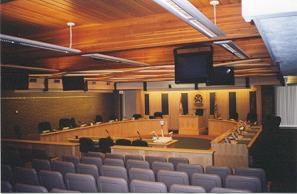The public won't be allowed to attend city council meetings until the province lifts its state of emergency, after city council approved changes to its procedures on Monday.
City council unanimously adopted the recommendations put forward in a report by city general manager of administrative services Walter Babicz to allow city council to continue conducting city business while complying with public health orders and best practices. While council meetings will be closed to the public and news media, the meetings will continued to be live-streamed and the videos will remain available on the city's website, Babicz said.
"This is a big set of changes that we need to consider for public health and medical safety," Coun. Garth Frizzell said. "Accountability is a key issue. This will solve that, while still preserving the safety of the (council) chambers."
A ministerial order under the B.C. Emergency Program Act issued on March 26 authorizes city councils to make a number of changes to their procedures during the ongoing COVID-19 pandemic.
"The ministerial order makes it clear that council doesn't have to have the public present," Babicz said.
The changes also authorize Mayor Hall to cancel or reschedule meetings, if needed or warranted. The intention is to potentially allow city council to only conduct a single meeting a month, if the amount of council business allows it, Babicz said.
"Unprecedented times require unprecedented measures," Mayor Lyn Hall said.
Under the measures approved Monday, all nine city councillors can chose to attend meetings remotely by phone, Babicz said. Normally a minimum of five members of council are required to be physically in the council chambers to maintain quorum, and councillors phoning in are not allowed to participate in public hearings.
Coun. Cori Ramsay raised concerns about the logistics of how city council will function if all the members of council are simply on a conference call to the chambers.
"Say all nine of us phone into a meeting, do we have a software program we can use to create a cue the way we do in chambers?" Ramsay asked.
Currently the city doesn't have any software to facilitate remote meetings, Babicz said, but staff will look into options.
In-person presentations to city council will also not be allowed while the measures are in place, Babicz said. Groups looking to present information to city council can write a letter or submit a PowerPoint presentation, he said.
City staff will also look at the possibility of allowing short video presentations to city council, Babicz said, after a suggestion by Frizzell.
"We currently don't have any delegations requests," Babicz added.
Over the weekend, the B.C. Ministry of Municipal Affairs and Housing informed city staff it is preparing guidelines for municipalities on how to conduct public hearings, Babicz said. However, in the meantime the ministry advised city councils to waive public hearings where possible.
That suggests the measures adopted by city council are similar to what the ministry is considering, Babicz said.
Under the measures adopted, city staff will simply cancel the informal hearing for development variance permit and temporary use permit applications. The city can simply publish notices and receive input from the public in writing regarding those applications, Babicz said.
For formal public hearings for rezonings, city council has the authority to waive public hearings if they application is consistent with the Official Community Plan, Babicz said.
"It would be up to council to decide, on a case-by-case basis, whether to proceed with a public hearing," he said. "City staff would not suggest waiving a public hearing if staff is recommending defeat, or on public hearings expected to generate significant public input."
If a hearing is waived by council, the public could still provide input in writing, Babicz said.
If a public hearing legally must be held because the application isn't consistent with the OCP, or council decides not to waive the hearing, city staff will delay the hearing as long as practical and hold them with provincially-mandated social distancing measures in city council chambers.
Frizzell said city staff and council have been surprised in the past by the amount of public input it's received at some public hearings.
City general manager of planning development Ian Wells will review the amount of written submissions about any given public hearing and make a decision if there is enough public interest to warrant recommending to council to hold a hearing, Babicz said.
"We want to make sure the public is going to have input on these things," Coun. Brian Skakun said.



